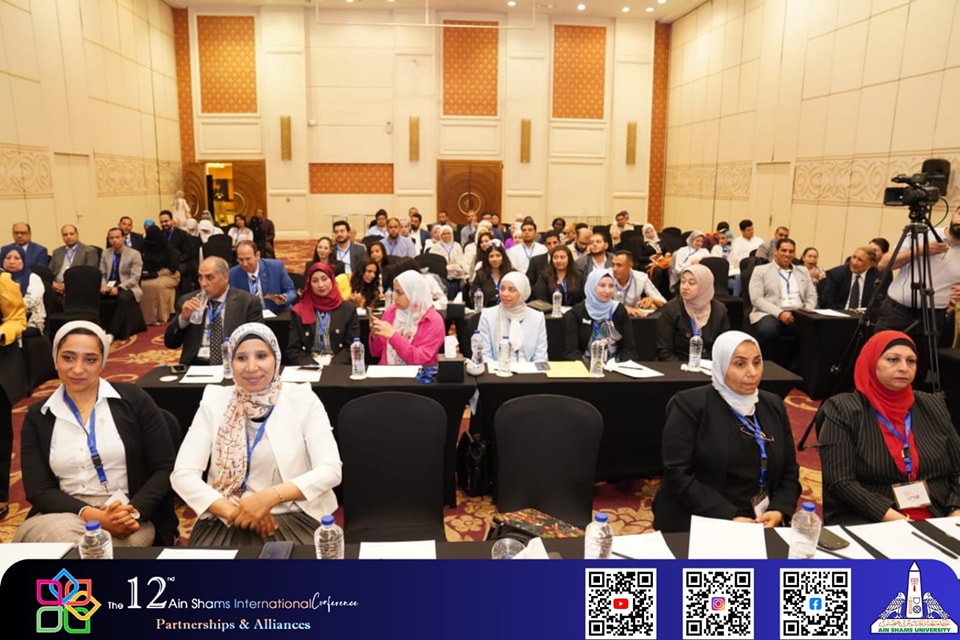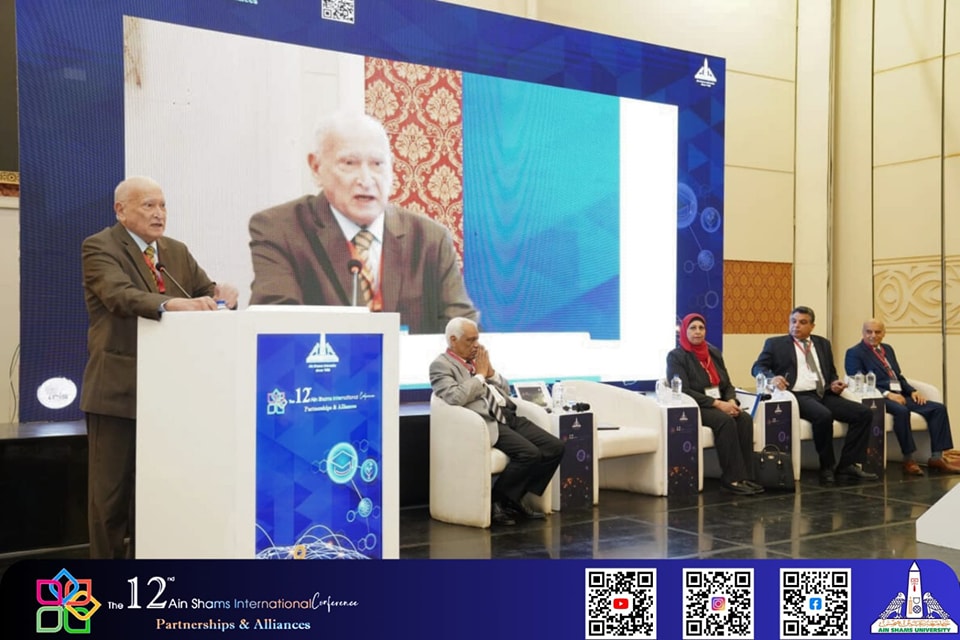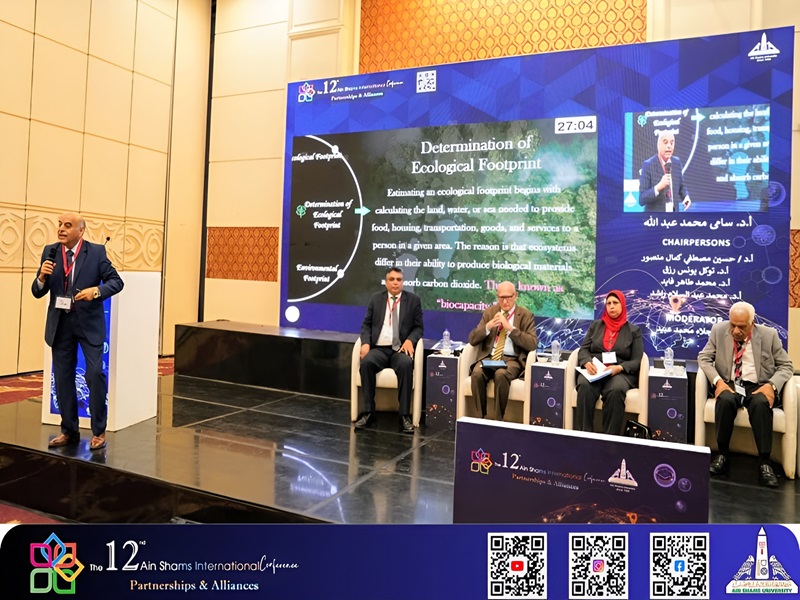The Partnerships in the agricultural sector within the activities of the 12th Annual Ain Shams University Conference
The university plays a pivotal role in producing knowledge and developing human competencies, while other institutions, whether governmental or private, seek to achieve their development and economic goals. Through alliances and partnerships, efforts are united to achieve mutual benefits and serve the general interests of society in a way that contributes to achieving sustainable development and societal prosperity, within the activities of the 12th Ain Shams University Conference, under the patronage of Pro. Mohamed Diaa Zain El-Abedeen, President of the University, and Prof. Ghada Farouk, Vice President of the University for Community Service and Environmental Development.
The partnerships session in the agricultural sector was headed by Prof. Thanaa Al-Noubi, Dean of the Faculty of Agriculture, Ain Shams University, and in the presence of Prof. Hussein Mustafa Mansour, Emeritus Professor at the Department of Animal Production at the Faculty of Agriculture, Ain Shams University, former President of the National Food Safety Authority and former Dean of the Faculty of Agriculture, Prof. Tawakkol Rizk, Emeritus Professor at the Department of Crops, Faculty of Agriculture, Ain Shams University, Prof. Mohamed Rashid, Emeritus Professor at the Department of Genetics, Faculty of Agriculture, Ain Shams University, and Prof. Naglaa Mohamed Obaid, Professor of Genetics at the Department of Genetics, Faculty of Agriculture, Ain Shams University.
Prof. Ashraf Bakri Abdel Razek, Professor and Head of the Genetics Department, and Executive Director of the Biotechnology Incubator Business(BIB), lectured and talked about the role of biotechnology business incubators in Egypt and the partnership with Nile University and the Cluster Alliance. In addition to Prof. Mustafa Saeed Fadila, Director of the Animal Reproduction Institute and Head of the National Campaign for Veterinary Therapeutic and Guidance Convoys for Small Breeders and Farmers, who spoke about the cooperation protocol between “Animal Reproduction Research” and the “Faculty of Agriculture, Ain Shams University, expanding training programs on research applications to serve the state’s goals in improving livestock and conservation on the health and safety of animals and humans, Prof. Sami Mohamed Abdullah, Professor of Lands, Faculty of Agriculture, Ain Shams University, talked about the environmental footprint: risks and warnings.
 |
 |
In this scientific session, light was shed on the vital role of alliances and partnerships between universities and other institutions in the agricultural sciences sector.
The importance of these partnerships is in many aspects, including enhancing scientific research, improving the quality of education, providing training and learning opportunities, transferring knowledge and technology, developing the local community, and increasing resources and funding. Through close cooperation and joint projects, expertise and resources are shared in a way that enhances the capabilities and achievements of all parties involved.
While cooperation and partnerships between universities and other institutions play an important role in many aspects, the most important of which are:
Promote scientific research: These partnerships allow the exchange of research expertise and resources, which helps to conduct advanced research and distinguished scientific achievements.
Improving the quality of education: through exchanging best educational practices and developing curricula in line with labor market requirements in partnership with the beneficiary entities (Federation of Industries - Chambers of Commerce - Export Council for Agricultural Crops - Export Council for Food Industries) - Ministry of Industry - Ministry of Agriculture - Ministry of Local Government - Ministry of Scientific Research.
Increase training and learning opportunities: These partnerships provide students with opportunities for practical training and learning from the experiences of different institutions and partnerships with international bodies and organizations (OIE-IPPC-WTO-FAO-WHO-ILO.
Enhancing the transfer of knowledge and technology: through cooperation in research and development projects, which contributes to the dissemination of knowledge and the application of modern technology.
Local community development: as these partnerships contribute to meeting the needs of the local community and promoting sustainable development.
Increasing resources and funding: through partnerships with the private sector and other institutions, which provides additional resources for research and development and activates the university’s role in expressing its opinion regarding national projects in the field of agriculture.
Issuing the Egyptian Atlas of the Environmental Footprint in cooperation with the ministries and concerned authorities, which includes: carbon footprint - energy footprint - water footprint - transportation footprint - digital footprint, the university and society together to activate and implement Egyptian Prime Minister’s Decision No. 4664 of 2022 regarding mechanisms for issuing and trading carbon emissions reduction certificates. Arabic and African.
Activating the recommendations of the Global Ecological Footprint Network submitted to the League of Arab States and the Arab Forum for Environment and Development to reduce the environmental footprint, in addition to the necessity of activating community participation in the transition to a green economy.
Establishing a cooperation protocol between Ain Shams University and the Egyptian Ministry of Environment to spread environmental awareness of the importance of the carbon footprint, therefore Alliances and partnerships between universities and other institutions are vital to enhancing scientific and educational achievements and meeting the needs of society.


.svg)

